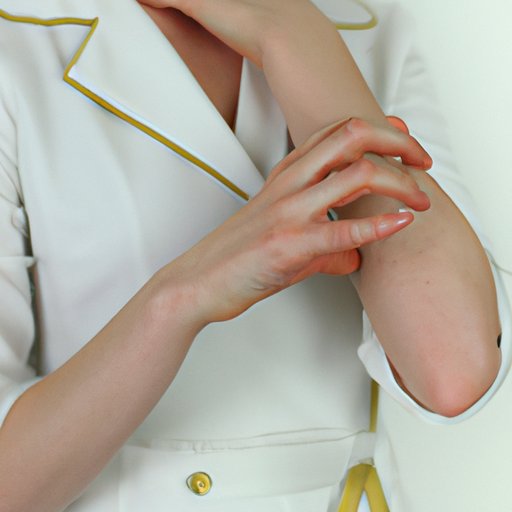Introduction
Itchy skin, or pruritus, is an unpleasant sensation that compels a person to scratch the affected area. It can be caused by a variety of conditions, including allergies, eczema, dry skin, psoriasis, and other skin problems. Understanding the cause of your itchiness can help you find the right treatment and relief.

Identifying the Cause of Itchy Skin
There are many potential causes of itchy skin. Here are some of the most common ones:
Allergies
An allergic reaction to something you’ve touched or eaten can cause itchy skin. Common triggers include foods, medications, latex, pet dander, and pollen. If you think you may have an allergy, talk to your doctor about testing.
Eczema
Eczema is a chronic skin condition that causes intense itching and inflammation. It is often triggered by environmental factors such as stress, heat, and certain fabrics. Treatment usually involves avoiding triggers, using moisturizers, and taking oral or topical medications.
Dry Skin
Dry skin can be caused by environmental factors such as cold weather, low humidity, and hot water. It can also be a side effect of certain medications. To treat dry skin, use a humidifier, avoid harsh soaps and cleaners, and moisturize regularly.
Psoriasis
Psoriasis is a skin disorder that causes red, scaly patches on the skin. It can be itchy and uncomfortable, and it is often treated with topical medications, light therapy, and lifestyle changes.
Other Causes
Other potential causes of itchy skin include insect bites, infections, kidney disease, liver disease, and cancer. If your itchy skin does not respond to home remedies, contact your doctor for further evaluation.
Home Remedies for Itchy Skin
There are several home remedies you can try for itchy skin. Here are some of the most popular:
Cold Compresses
Applying a cold compress to the affected area can help reduce itching and inflammation. Wrap ice cubes in a clean cloth and apply it to the itchy area for 15 minutes at a time.
Oatmeal Baths
Oatmeal has anti-inflammatory properties that can help soothe itchy skin. Add 1 cup of oatmeal to a warm bath and soak for 15-20 minutes. You can also make an oatmeal paste and apply it directly to the affected area.
Coconut Oil
Coconut oil has anti-inflammatory and antifungal properties that can help relieve itchy skin. Apply a thin layer of coconut oil to the affected area three times a day.
Apple Cider Vinegar
Apple cider vinegar can help reduce itching and irritation. Dilute one part apple cider vinegar with four parts water and apply it to the itchy area with a cotton ball. Do this twice a day until the itching subsides.
Aloe Vera
Aloe vera has cooling and soothing properties that can help relieve itchy skin. Extract the gel from an aloe vera leaf and apply it directly to the affected area. You can also use aloe vera lotion or cream.
Over-the-Counter Treatments for Itchy Skin
If home remedies don’t provide relief, there are several over-the-counter medications that can help. Here are some of the most popular:
Antihistamines
Antihistamines can help reduce itching caused by allergies. Many antihistamines are available without a prescription, but always read the label and follow the directions carefully.
Hydrocortisone Creams
Hydrocortisone creams can help reduce inflammation and itching caused by eczema, psoriasis, and other skin disorders. These creams are available over the counter in mild strength, but stronger versions require a prescription.
Topical Anesthetics
Topical anesthetics can provide temporary relief from itching. These products contain ingredients such as benzocaine, lidocaine, and pramoxine, which work by numbing the affected area. Follow the package instructions carefully.

Natural Solutions for Itchy Skin
In addition to home remedies and over-the-counter treatments, there are several natural solutions that can help relieve itchy skin. Here are some of the most popular:
Tea Tree Oil
Tea tree oil has antiseptic and anti-inflammatory properties that can help reduce itching. Mix a few drops of tea tree oil with a carrier oil such as jojoba or almond oil and apply it to the affected area.
Witch Hazel
Witch hazel has astringent and anti-inflammatory properties that can help reduce itching. Dab witch hazel onto the affected area with a cotton ball two to three times a day.
Honey
Honey has antibacterial and anti-inflammatory properties that can help soothe itchy skin. Apply a thin layer of honey to the affected area and leave it on for 15 minutes before rinsing it off.
Chamomile
Chamomile has anti-inflammatory and antibacterial properties that can help reduce itching. Steep chamomile tea bags in hot water and apply the cooled tea bags to the affected area.

When to See a Doctor for Itchy Skin
In some cases, itchy skin may require medical attention. See your doctor if you experience any of the following symptoms:
Persistent Itchiness
If your itchy skin does not respond to home remedies or over-the-counter treatments, you should see your doctor for further evaluation. Your doctor may be able to prescribe a stronger medication or recommend other treatments.
Rash with Fever or Chills
If you develop a rash along with fever or chills, it could be a sign of an infection. Contact your doctor right away for further evaluation and treatment.
Severe Swelling
If the affected area becomes swollen and painful, it could be a sign of an allergic reaction. Seek medical attention right away.
Blistering or Open Sores
If you develop blisters or open sores on your skin, it could be a sign of a serious condition such as shingles or chickenpox. See your doctor for further evaluation.
Conclusion
Itchy skin can be caused by a variety of conditions, including allergies, eczema, dry skin, and psoriasis. There are many home remedies and over-the-counter treatments available to help relieve itching, as well as natural solutions such as tea tree oil, witch hazel, honey, and chamomile. If your itchy skin does not respond to home remedies or over-the-counter treatments, or if you experience severe swelling, blistering, or open sores, see your doctor for further evaluation and treatment.


